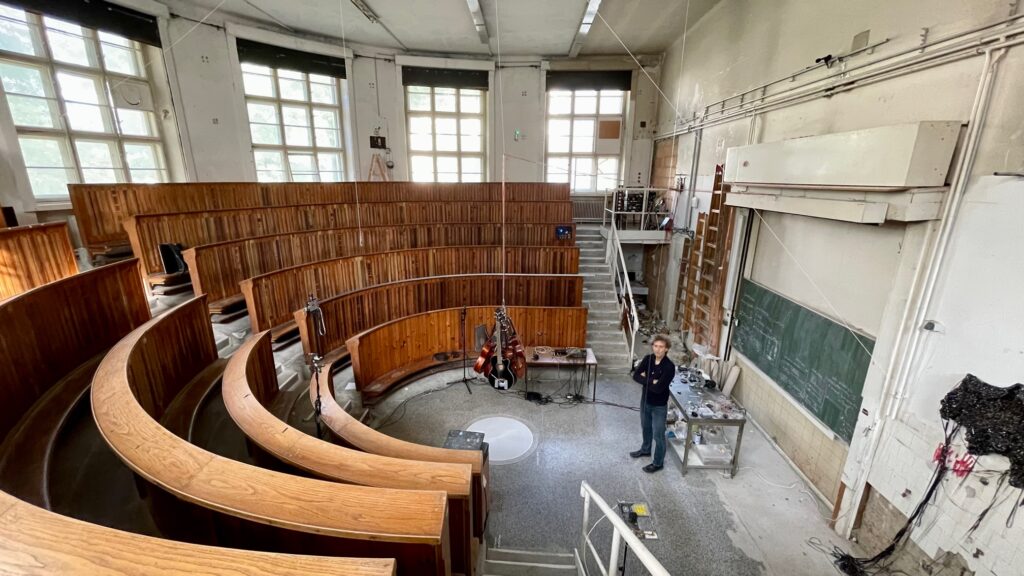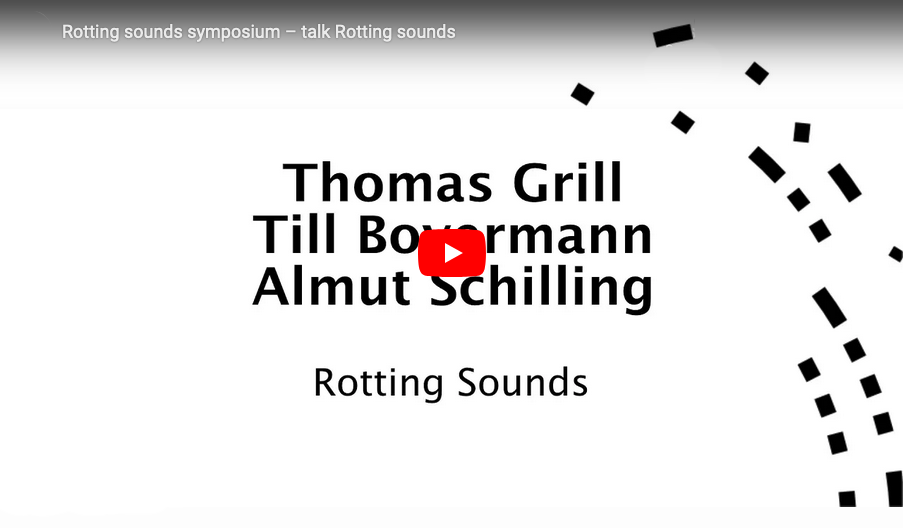Fragments of Rotting Sounds, book presentation March 27, 2025
Our book Fragments of Rotting Sounds appears in paper at Mark Pezinger Publishing (edition of 20) and also as a digital version (infinite edition) on the Research Catalogue.
The book presentation takes place March 27 2025, 18h at the Bankettsaal of mdw – University of Music and Performing Arts Vienna, Anton-von-Webern-Platz 1, 1030 Wien.
Article “Artistic Research Practice in Experimental Sound Art” in Zeitschrift der Gesellschaft für Musiktheorie 19/2
Bovermann, Till / Thomas Grill / Almut Schilling (2022), »Rotting Sounds. Artistic Research Practice in Experimental Sound Art«, Zeitschrift der Gesellschaft für Musiktheorie 19/2.
The majority of today’s media is produced in the digital domain. Although digital data are adorned by a myth of perfection, everyday experience does provide evidence for the existence of degradation and, ultimately, data loss in various forms. The multi-year artistic research project Rotting Sounds has investigated the causes, mechanisms, and effects of such deterioration, specifically in the context of digital audio. This report gives a condensed account of some of the theoretical foundations and methodical approaches chosen. The digital-analog interface, information encoding, as well as the deep time perspective are specifically highlighted. We present a number of artistic works that have been developed as experimental systems to co-generate questions and finally lead to various conclusions. These concern the controllability of such experiments and the interrelationships between (sound) information and its environment. The term of digital patina was introduced to characterize observed aesthetics in permanent transformation and to open up a new perspective on the existence of the digital in a material context.
https://doi.org/10.31751/1174
Research Day 2021, Academy of Fine Arts, November 11
Almut Schilling will hold a lecture at the Research Day 2021, titled “Auditorium of Rotting Sounds: Maintaining Digital Decay”
At the beginning of the artistic research project we manifested that data degrade inevitable and we do perceive decay as transformation. With the establishment of the Auditorium of Rotting Sounds an extraordinary space, dedicated to site specific artworks, was created, to let the sound objects rot.
But how to control the temporal transformation of digital data, which basically are inherent dynamic systems? How to classify determinants and the symptoms of decay and its effects? And how to understand and perceive those created aesthetics?
Considering the difference between things (physical entities defined by its material properties) and objects (conceptual entities generated and perceived by semantically thinking) it is fundamental to ensure a certain legibility within the flow of time, which means to prevent that those entities are drifting too far apart. Consequently the maintenance, the controlled ›aging‹, appeared to reflect the individual artwork conceptually and its growing patina.
11.11.2021, 10:00–17:45
Akademie der bildenden Künste Wien, Schillerplatz 3, 1010 Wien, Sitzungssaal
Rotting Sounds takes part in the panel “On Sustaining Sounds and Images”
In the context of the annual conference of the International Council for Traditional Music on the Topic of “Sustainable Futures – Practicing Methodological, Scientific and Institutional Sustainability in Ethnomusicology” in Salzburg, Austria.
Auditorium of Rotting sounds, open 12.11. 15:30-18:00
On the occasion of the Wien Modern festival‘s event Einschreibung, Übertragung, Abtragung (Inscription, Transmission, Erosion) taking place at the mdw Future Art Lab building, we will open the Auditorium of Rotting sounds, the sound art exhibition of the artistic research project rotting sounds, in the afternoon prior to the concert.
The following time slots are available for a maximum of 10 visitors each: 3:30 pm, 4:00 pm, 4:30 pm, 5:00 pm, 5:30 pm.
Please register with auditorium@rottingsounds.org stating your preferred time slot.
APA science article on Rotting sounds project
Mario Wasserfaller of APA has interviewed Thomas Grill prior to the Symposium of Rotting Sounds about the background, methods and results of the project.
See https://science.apa.at/mehrzumthema/neues-leben-fuer-untote-klaenge (in German)

Online guest lecture at KTH Royal Institute of Technology, November 2
Rotting sounds – Digitality and materiality
Most of today’s media output, be it audio or video, is produced and stored in the digital domain. Although digital data are adorned by the myth of lossless transmission and migration, everyday experience does prove the existence of degradation and, ultimately, data loss in various forms. This pertains to the physical nature of storage media and playback devices as well as to media formats and software in the context of their technological infrastructure. The ongoing multi-year project of artistic research “Rotting sounds” strives to elaborate on the causes, mechanisms and effects of such deterioration, specifically in the context of digital audio.
In this talk, I will focus on the material nature of the digital and its implications. I will illustrate this with concrete artistic works that have been created in the course of research.
Time: November 2nd 2021, 15:00 CET
Location: https://kth-se.zoom.us/j/61230315241
Article in MDW magazine, October 2021
The web and print magazine of the University of Music and Performing Arts Vienna (MDW) has published a new article on the current state of the Rotting sounds project.
Rotting sounds symposium, September 23+24
Since 2018, the project of artistic research Rotting sounds – Embracing the temporal deterioration of digital audio has been researching transformation processes pertaining to the diverse interrelations of digitally encoded information in the audio domain, its material properties and (human) interpretation within a sociocultural context. This symposium provided a room for reflection on the acquired experiences in the course of the project, to bring in external viewpoints on the relevant topics and stimulate outlooks beyond the limits of current research.
Find more info here.
co-curated and produced by sound:frame

